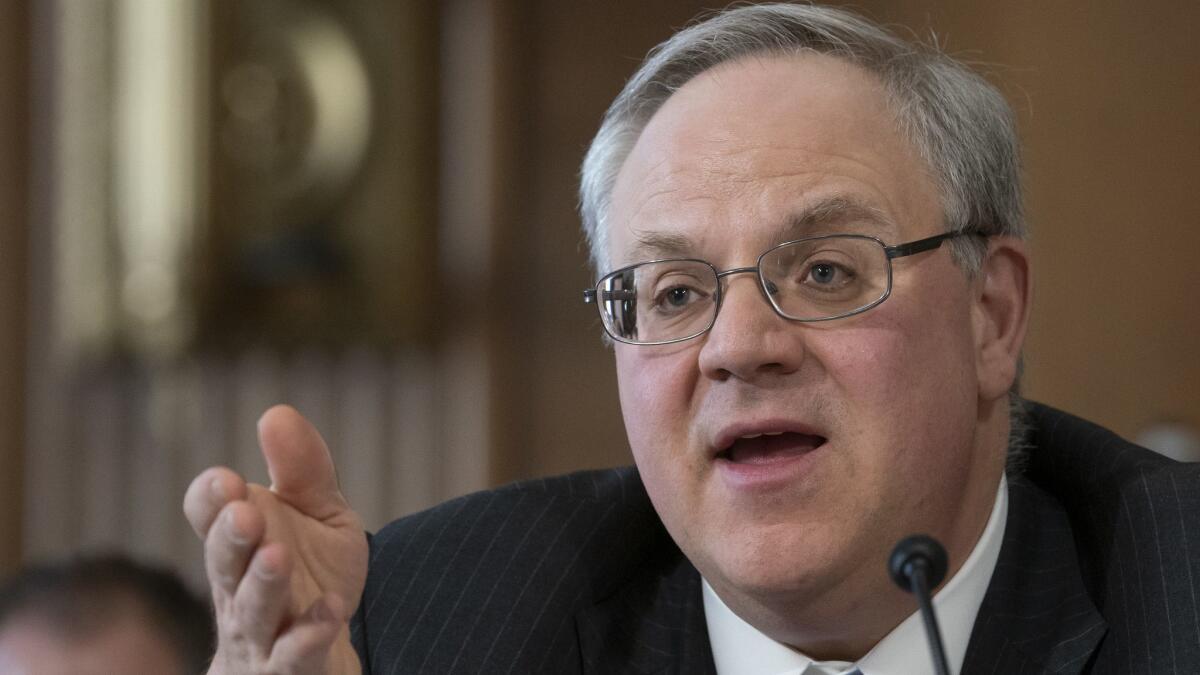Column: See how the Interior Department has tried to stifle ethical doubts raised about its acting chief

When it comes to acting Interior Secretary David Bernhardt’s involvement in plans to loosen environmental restrictions on water flows for Central Valley farmers, a few things are clear and many more are murky.
What’s clear is that Bernhardt, who became deputy Interior secretary in 2017, was involved in decisions connected with those efforts. It’s also clear that the department’s actions would yield major benefits for the giant Westlands Water District, a client of Bernhardt’s during his years as a lawyer for agricultural interests in California.
The murkiness comes from the Interior Department’s efforts to defend Bernhardt against accusations that he has violated government ethics rules, lobbying regulations, and his own ethics commitments. Put simply, the department’s ethics rulings are transparently bogus.
The Senate could be on its way to installing an Interior secretary who could almost immediately face investigation for corruption and lying under oath.
— Sen. Ron Wyden (D-Ore.)
“The public now can’t be sure if these decisions were made because they’re in the best interest of the public, or because acting Secretary Bernhardt has a former client with a big interest in getting this water and he put his thumb on the scale to make it happen,” says Delaney N. Marsco, ethics counsel for the Campaign Legal Center in Washington, which has questioned the ethics rulings.
That’s not the only question raised about Bernhardt, who has been accused of coming into office saddled with conflicts of interest on a dizzying scale. Sen. Ron Wyden (D-Ore.) has implied that Bernhardt lied to a congressional committee during his confirmation hearing in late March, when Wyden questioned Bernhardt about evidence that he had personally intervened to block an agency report on the impact of toxic pesticides on endangered species. Bernhardt claimed the report had not undergone a legal review and that Interior Department attorneys agreed with his assessment, but Wyden suspects those claims are untrue.
These issues are urgent, because a Senate floor vote to confirm Bernhardt as Interior secretary may be only a day or two away. It’s currently scheduled for Thursday. Yet, as Wyden observed from the floor in calling for a delay in the confirmation process on April 3, “The Senate could be on its way to installing an Interior secretary who could almost immediately face investigation for corruption and lying under oath,” Wyden said.
That wouldn’t be a good look for the Interior Department, which holds sway over millions of acres of federal lands and the disposition of crucial water supplies through much of the West, especially California. The agency’s last secretary, Ryan Zinke, resigned Dec. 15 under a cloud of corruption accusations remarkable even for the ethics-challenged Trump administration.
Bernhardt’s case also underscores the toothlessness of the federal government’s ethics enforcement regime. The first line of defense at the Interior Department is its inspector general’s office, which says it is “reviewing” the information provided by the Campaign Legal Center, but hasn’t opened an investigation of the nominee. The IG hasn’t yet responded to a request from Wyden for an investigation of a raft of allegations of ethics violations by Bernhardt.
The system depends heavily on voluntary compliance from the top down — if the IG recommends disciplinary action against Bernhardt, the decision would be in the hands of the Trump White House, which hasn’t shown much willingness to conform to ethical norms. No one other than Trump could remove Bernhardt, and any decisions he made in office, including those found to have favored his former clients, would remain in place.
Bernhardt has done little to hide his antipathy for federal laws and regulations that interfere with the smooth operations of his former clients. He has been the spear carrier for Trump administration efforts to emasculate the Endangered Species Act, which creates roadblocks for the exploitation of natural resources by commercial interests — water users such as Westlands, for instance.

So let’s look at Bernhardt’s questionable actions, and at how the Interior Department ethics overseers have given him a free pass.
The key issues raised by the Campaign Legal Center and by Democratic Sens. Elizabeth Warren of Massachusetts and Richard Blumenthal of Connecticut involve Bernhardt’s participation in actions aimed at increasing water flows to agricultural users in the Central Valley.
Those users get their water from the federal Central Valley Project (CVP) and the State Water Project (SWP), but their supplies have been constrained by legal judgments and scientific assessments of how increased water for the farmers will affect fish in the region.
Bernhardt joined the Interior Department as deputy secretary in August 2017 from the law firm of Brownstein Hyatt Farber Schreck. As my colleague Bettina Boxall has documented, at the law firm he lobbied for Westlands, among other clients with interests before the agency. Nevertheless, after he joined the department, he participated in discussions aimed at reopening the environmental analysis of water flows, with an eye toward increasing them. That would manifestly benefit Westlands.
Bernhardt’s specific actions included launching a new environmental impact statement for the CVP and moving ahead with reconsideration of the biological assessments that underlay the restrictions on agricultural water. Both were plainly aimed at increasing water for growers, and that meant Westlands.
Bernhardt, however, had explicitly agreed upon taking office to recuse himself for at least a year from “particular matters involving specific parties” including Westlands, one of 25 companies or organizations he listed as having represented.
How did he get around this? Interior’s ethics officials simply categorized the discussions as “matters,” rather than “particular matters.” The discussions that involved water flows from the CVP and SWP were general, not specific enough to count as benefiting Westlands.
The discussions about the environmental impact statement were “focused on the broad policy of restoring … water supply,” the ethics officers ruled. The biological assessment was to incorporate the “impacts of all federal, state, and private actions and other human activities” in the affected area, which made it “much broader” than a document aimed at helping Westlands. Ergo, they weren’t “particular matters” warranting recusal. (When I asked Bernhardt’s spokeswoman if he had any comment, she referred me to the ethics officers’ memo.)
Bernhardt’s critics consider this argument to be absurd, with good reason. The department’s own analysis acknowledged that any action “focused on the interests of a discrete and identifiable class” was specific enough to warrant recusal.
In these cases, the affected parties were roughly 300 water contractors drawing supplies from the CVP and SWP. All are in the Central Valley, all are directly affected by any decision to increase or limit water from the two projects, and all are identified. Westlands is the largest.
The goal of the Interior Department decisions was to increase their water by reducing the constraints placed on the projects by the Endangered Species Act, the Campaign Legal Center asserted in a letter to the agency’s inspector general: “This is the precise subject of his lobbying for one specific water contractor, Westlands Water District, prior to joining government.”
The Campaign’ Legal Center maintains that Bernhardt’s activities violate not only the letter, but the spirit of the ethics rules. “The spirit of the whole ethics regime is to avoid even the appearance of impropriety,” Marsco says. “They exist because people need to have trust that their government officials are acting in the public interest. It boggles the mind that Bernhardt would even go near a CVP issue if he’s working in the public’s interest.”
Bernhardt’s spokeswoman, Faith Vander Voort, has stated in the past that Bernhardt is “completely compliant with his ethics agreement and he takes it very seriously.”
Yet the Interior Department’s tortured explanation of why there’s no conflict of interest in administrative decisions that will plainly benefit a former client smells like a search for loopholes, not a genuine commitment to avoiding conflicts or the appearance of conflicts.
The damage done to the public’s trust in its government is massive and lasting, and if the Senate confirms Bernhardt without at least a further inquiry, it’s complicit in the loss.
Keep up to date with Michael Hiltzik. Follow @hiltzikm on Twitter, see his Facebook page, or email [email protected].
Return to Michael Hiltzik’s blog.
More to Read
Get the L.A. Times Politics newsletter
Deeply reported insights into legislation, politics and policy from Sacramento, Washington and beyond. In your inbox three times per week.
You may occasionally receive promotional content from the Los Angeles Times.











